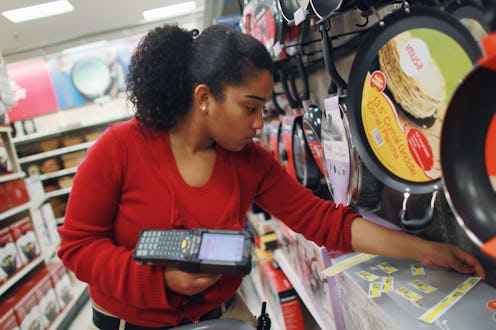Life
Women Lost More Retail Jobs Than Men Over The Last Year, According To A New Study

As online retailers become our collective go-to for shopping, brick and mortar stores are struggling to retain customers. The convenience of online shopping is good for consumers, but less in-store revenue is actually hurting hourly retail workers — especially women and people of color. Two new studies recently found that women working in retail lost jobs while men gained them from Nov. 2016 to Nov. 2017, and that Black retail workers had a harder time finding jobs than their white peers.
The Institute for Women’s Policy Research (IWPR) analyzed the December employment report from the U.S. Bureau of Labor Statistics (BLS) and found women gained 985,000 jobs in retail while men gained 1,086,000 over the past year. IWPR’s analysis also found that the retail trade industry experienced the greatest job losses throughout the year as compared to other industries like government, construction, and transportation. Women in the industry “shouldered the entirety of the job losses in retail trade,” according to the report. Men came out much better with considerable increases in employment. What gives?
Heidi Hartmann, the president of the Institute for Women's Policy Research and one of the authors of the study, told NPR: “We were quite surprised because we think of retail trade as a women's industry. The biggest losses for women were in general merchandise stores and the biggest gains for men were in the same kind of stores — and that's the hugest part of retail.”
Hartmann and her team were so shocked by their findings that they have vowed to do more research in the spring and explore a data set that takes into account demographic variables, such as race and ethnicity, which are crucial factors when it comes to analyzing discrimination.
A separate study out of Toronto looked at the job prospects of retail workers based on race, and the findings showed that Black job applicants were less likely to receive callbacks. The Toronto Star reports that the research found that Black applicants had a harder time finding an entry level retail job in Toronto than white applicants with a criminal record.
According to the Toronto Star, Janelle Douthwright, the study's author, conducted this study by creating four fictional female job applicants. The Black applicants were given "Black sounding" names like Khadija Nzeogwu and Tameeka Okwabi. One was given a criminal record while the other was not, but both applicants listed a Black or African student association on their resume.
The fictional white applicants were treated similarly. Both were given "white sounding" names like Beth Elliot and Katie Foster. One listed a criminal record during the application, and the other didn’t. Both the Black and white applicant listed a similar criminal offense.
All four candidates applied to 64 jobs each. Aside from the racial identifiers, all the résumés were very similar, with all of the applicants having a high school education and related job experience.
As reported by the Toronto Star, the white candidate with no criminal record got the most callbacks by far (20). But that’s not the most interesting part. The white applicant with a criminal record got more callbacks (12) than the Black candidate without a criminal record (seven), despite having the same education and work experience. The Black applicant with a criminal record only received one callback out of 64 applications. Though this study was local to Toronto, it carries implications about how discrimination affects people of color looking for entry-level jobs.
After reading the results of this study, Lorne Foster, a professor in the Department of Equity Studies at York University, told the Toronto Star, “We all need to be vigilant about our thoughts about other people, our hidden biases and images of them.”
These two studies point to biases that many people have experience with: Systemic racism and sexism have real world consequences for women and people of color. While you can see this affect in many industries, these studies show the effect on the retail industry in particular — and especially affect people who are trying to get jobs in retail.